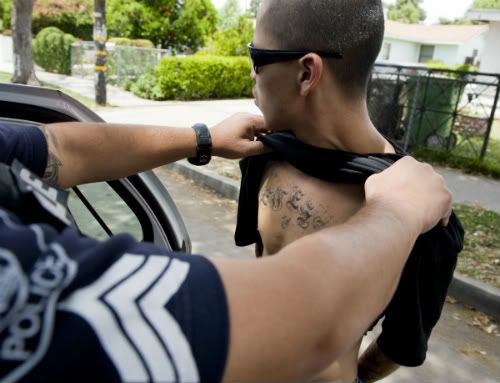Last night, I was hanging out with my friend Josue and we got talking about gangs in Orange County. Josue grew up in Santa Ana and Anaheim, in places where there are large latino gangs. As someone who lives in downtown Fullerton, and cares about the community, I am interested in gangs. I want to understand them.
The first thing I asked Josue about was graffiti. I like street art, but I must admit that I don't really like the "tagging" type of graffiti. To me, it is incomprehensible. Plus, I really hate it when they scratch their tags onto store windows. My business's windows got scratched a few times, and it is quite expensive to fix that stuff. I asked Josue what "tagging" its all about.
He said it was largely territorial. Gang members give themselves pseudonyms like "Shorty" or "Lazer" or whatever, and they tag their gang names on places in the area where they live. It's like a way of saying "I live here. This is my territory." Tagging ones name is also a way to obtain prestige within a gang. If you tag your name around a lot, you get noticed, and maybe respected.
I asked Josue, who was never in a gang, if he felt pressure to join a gang. I wondered if people joining gangs was something they wanted to do, or if it was something they felt pressured to do. He said that, in his high school, the gang members would bully younger students into joining a gang. They would ask the student to sell weed for them, or do some favor. If the student did not comply, they might get beat up. Josue, being a quiet nerdy kid who didn't speak much English, managed to stay off the radar of the gang recruiters.
He talked about gang members selling weed right in their high school classrooms, during class. Once in a gang, students stayed in gangs out of a mixture of fear (of getting beat up), pride (at being respected/feared), and perhaps a sense of belonging. One may ask, where are the parents of these young gang members? Usually, they are working. Orange County is an expensive place to live, especially if you are an immigrant from Latin America. Usually, both parents have to work full time, out of financial necessity.
Thus, gangs are a complex product of socio-economic situations, juvenile masculinity, a need to belong, rebellion, and other things I don't yet understand. I am trying to understand. I really believe that if we took the time to understand gangs, why they arose in the first place, what function they have in their communities, we might begin to find ways to give these kids a real and viable alternative.

